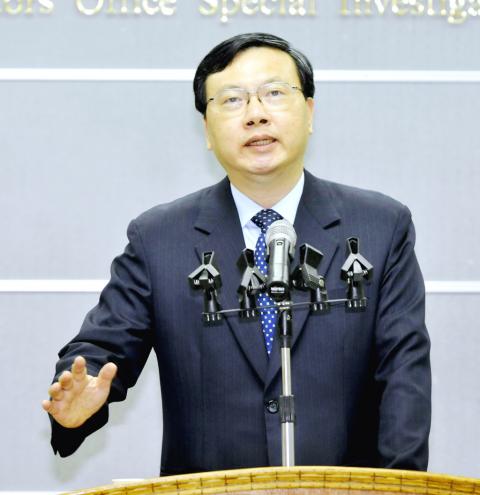Chen Chi-hsiang (陳啟祥), a key suspect in a case of alleged bribery involving former Executive Yuan secretary-general Lin Yi-shih (林益世), was detained and questioned by the Supreme Prosecutors’ Office Special Investigation Division (SID) yesterday.
Chen, head of Ti Yung Co (地勇選礦公司), a metal-recycling company, has accused Lin of accepting a bribe of NT$63 million (US$2.15 million) to help him secure procurement contracts from China Steel Corp (中鋼) and two of its subsidiaries in 2010, and of asking for a further NT$83 million this year.
Chen, who allegedly went into hiding after the Chinese-language Next Magazine published his accusation on Wednesday, was arrested on Friday night at a hotel in Taipei City.

Photo: Lin Cheng-kung, Taipei Times
Chen was yesterday named a defendant in the investigation and was released after being questioned for 12 hours.
Lin on Friday was also named a defendant in the case and is expected to be summoned for questioning over the next few days.
SID spokesman Chen Hung-ta (陳宏達) told a press conference yesterday that the agency launched an investigation into the case soon after Next Magazine published the allegation on Wednesday.
SID prosecutor Tsai-Hung-jen (蔡宏仁) is in charge of the case, Chen Hung-ta said, adding that Tsai subpoenaed Chen Chi-hsiang to testify as a witness, but when the notice was delivered to his residence in Greater Kaohsiung, Chen Chi-hsiang was not at home and appeared to have severed connections with his family and friends.
It was later discovered that Chen Chi-hsiang had spent the past few days at a hotel in Taipei’s Xinyi District (信義). Tsai and investigators arrested him in his hotel room at 11pm on Friday, the spokesman said.
According to Chen Hung-ta, Chen Chi-hsiang immediately called three attorneys, who came to the hotel, and then declined to be questioned until the next day.
A female friend of Chen Chi-hsiang was with him at the hotel and prosecutors interviewed her as a witness yesterday morning, Chen Hung-ta said, adding that after considering the degree of Chen Chi-hsiang’s suspected involvement in the case prosecutors had decided to name him as a defendant.
Separately yesterday, Lin’s lawyer, KMT Taipei City Councilor Lai Su-ju (賴素如), said her client was willing to meet with Chen Chi-hsiang face to face.
“However, Lin will not respond to accusations made by members of the Democratic Progressive Party (DPP). This is not a political issue, it is a legal one. It is therefore desirable to avoid giving the DPP the opportunity to manipulate it for its own political ends,” she said.
Additional reporting by Mo Yan-chih

AGING: As of last month, people aged 65 or older accounted for 20.06 percent of the total population and the number of couples who got married fell by 18,685 from 2024 Taiwan has surpassed South Korea as the country least willing to have children, with an annual crude birthrate of 4.62 per 1,000 people, Ministry of the Interior data showed yesterday. The nation was previously ranked the second-lowest country in terms of total fertility rate, or the average number of children a woman has in her lifetime. However, South Korea’s fertility rate began to recover from 2023, with total fertility rate rising from 0.72 and estimated to reach 0.82 to 0.85 by last year, and the crude birthrate projected at 6.7 per 1,000 people. Japan’s crude birthrate was projected to fall below six,

US President Donald Trump in an interview with the New York Times published on Thursday said that “it’s up to” Chinese President Xi Jinping (習近平) what China does on Taiwan, but that he would be “very unhappy” with a change in the “status quo.” “He [Xi] considers it to be a part of China, and that’s up to him what he’s going to be doing, but I’ve expressed to him that I would be very unhappy if he did that, and I don’t think he’ll do that. I hope he doesn’t do that,” Trump said. Trump made the comments in the context

SELF-DEFENSE: Tokyo has accelerated its spending goal and its defense minister said the nation needs to discuss whether it should develop nuclear-powered submarines China is ramping up objections to what it sees as Japan’s desire to acquire nuclear weapons, despite Tokyo’s longstanding renunciation of such arms, deepening another fissure in the two neighbors’ increasingly tense ties. In what appears to be a concerted effort, China’s foreign and defense ministries issued statements on Thursday condemning alleged remilitarism efforts by Tokyo. The remarks came as two of the country’s top think tanks jointly issued a 29-page report framing actions by “right-wing forces” in Japan as posing a “serious threat” to world peace. While that report did not define “right-wing forces,” the Chinese Ministry of Foreign Affairs was

PREPAREDNESS: Given the difficulty of importing ammunition during wartime, the Ministry of National Defense said it would prioritize ‘coproduction’ partnerships A newly formed unit of the Marine Corps tasked with land-based security operations has recently replaced its aging, domestically produced rifles with more advanced, US-made M4A1 rifles, a source said yesterday. The unnamed source familiar with the matter said the First Security Battalion of the Marine Corps’ Air Defense and Base Guard Group has replaced its older T65K2 rifles, which have been in service since the late 1980s, with the newly received M4A1s. The source did not say exactly when the upgrade took place or how many M4A1s were issued to the battalion. The confirmation came after Chinese-language media reported